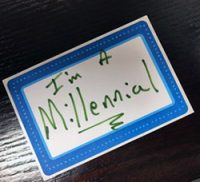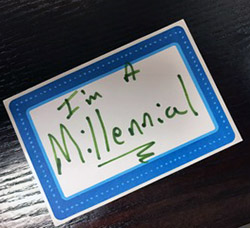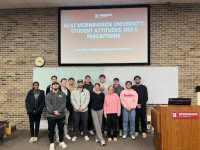 By Jenni Beaver–It’s like the ending of a classic Scooby Doo episode, but instead of “those meddling kids” we hear “those [insert adjective here] millennials.”
By Jenni Beaver–It’s like the ending of a classic Scooby Doo episode, but instead of “those meddling kids” we hear “those [insert adjective here] millennials.”
It plays over and over in the airwaves of society. Millennials are entitled, lazy, spoiled, clueless. They’ll never make it in the workforce. If they would only do things the way [insert generation here] did.
At a marketing conference last spring I, along with two students and two professors, sat in a room filled with marketing college educators and listened to them gab about how millennials were [insert stupid complaint here]. That’s when I started to wonder… are we really that different?
According to Dr. Geoff Harkness, sociology professor at Morningside College, millennials are different, just like Generation X-ers were different from Baby Boomers. He doesn’t see the differences as a glaring sign that millennials are meant to rock the world off its axis.
Those differences that are apparent, he says, come from technology. It plays a large role in how millennials not only view the world, but also themselves. The Internet gives us free reign to be whomever we want, whenever we want. There are no boundaries or, if they are there, the opacity is turned down.
All of a sudden we would rather text our crush rather than talk to them, because, if we text them, we can craft the perfect words.
The “in-crowd” is no longer a lunch table, it’s a group chat.
Popularity has nothing to do with the names signed in your yearbook. Now it’s about how many followers you have on Instagram.
Larger corporations have taken notice of the new communication trends that millennials enjoy. They see an opportunity. Harkness says his biggest reservation is that these companies capitalizing on the technological revolution only see a financial opportunity.
Marketer and Morningside professor, Dr. Marilyn Eastman says companies are absolutely taking advantage of the millennials. We are, in the marketing world, a unique breed. When we want to make a purchase, well-crafted advertisements on television or in magazines won’t cut it. We deeply value the opinions of others.
Let’s say Jane wants to buy a new pair of shoes. First, she’ll see the financial risk. She has to have enough money to buy them, but for Jane the biggest issue is the social risk. She wants her peers to approve. So, she posts on Twitter asking if she should purchase the red or black. Just like that, Jane gets responses and the face of marketing changes forever.
“Marketers understand they have to involve and engage millennials in the brand through various modalities,” says Eastman.
The truth is no one has really figured us out yet. We haven’t even figured ourselves out. We live in a society that changes every day and we know that if we don’t change with it, we’ll get left behind.
Developmental psychologist Dr. Jessica Pleuss echoes the sentiment that millennials are different in an unknown way. Technology almost requires us to look at the world differently, but whether or not that’s significant, as Pleuss says, the jury is still out.
One thing she knows for certain is that technology poses exciting innovations but also scary backlash. As millennials we have the world at our fingertips. Every bombing and shooting appears as a blip on our screens. We click on it and have all of the information available. We know almost immediately after it happens. Social media demands timelines, and Pleuss suggests that this affects millennials more than other generations.
“It’s not that bad things didn’t happen before,” she says. “We just didn’t always know about them.”
Morningside College junior, Taylor DeVary says, “Most of the news I see is from social media.” While she believes the negative news affects her, she tries to find good stories to balance the scale.
When asked if this would become a trend, Pleuss said she hoped we would learn from the millennials. The Internet came on the scene twenty years ago and we’re still figuring it out. Millennials were kind of the test run. They got the brunt of the good, bad, and ugly. Hopefully the next generation gets an experience without all the kinks that we worked out.
What else do we hear about millennials? Oh, that’s right. We’re too [insert complaint here] to ever make it in the workforce.
Pleuss shook her head at that assumption. “I think you’ll do just fine,” she said. “I think the workforce will change with you… you’re a high-achieving group.” We just don’t do things the same way as generations before us. We find new ways to think, create, communicate, and live. That’s part of living in the middle of, as Dr. Harkness calls it, the technological revolution.
We were born in the boom and now we’re living in the explosion.
- Does that affect us positively or negatively? We don’t know.
- Does that make us incredibly different from our older-generations? We don’t know.
- Is any of this significant? We don’t know.
Millennials may be different based on the world we live in. Its innovations are remarkable and we are in the wake of it trying to make sense of every piece. That makes us dramatically different than those before us.
One day we’ll know more about what all of this means.






Leave a Reply